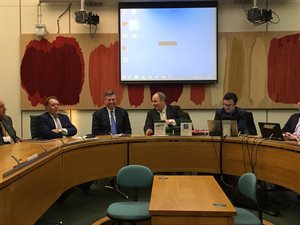<< Return to Previous Events
The Centre for Opposition Studies, UoB and The Centre for British Politics and Government, KCL invite you to: “Margaret Thatcher as Leader of the Opposition, 1975-1979” with Sir Adam Ridley and Emily Stacey on Thursday, 28th November 2019 at 6.30pm at King’s College London, Strand Building, Room -1.04
In the first of a series of joint events to launch the Centre for Opposition Studies’ new academic network, the Centre for British Politics and Government at King’s College London will host a panel discussion examining Margaret Thatcher’s leadership of the Opposition between 1975 and 1979.
During this, the 40th anniversary year of Mrs Thatcher entering government, there has been much focus on her time in office. But less attention has been paid to how she got there, and the policy platform she developed in the years immediately prior to entering Number 10. We are pleased to present this seminar, featuring economist Sir Adam Ridley, who was a close adviser to Mrs Thatcher during those years, and Emily Stacey of Oxford Brookes University, whose research focuses on this period.
The event will be chaired by Dr Nigel Fletcher, who is Research Director of the Centre for Opposition Studies and a Teaching Fellow in the Department of Political Economy at King’s. To attend, please visit Eventbrite to reserve a place.
Sir Adam Ridley was a member of the Government Economic Service 1965-74 , serving in the DEA, HM Treasury and the Central Policy Review Staff. In 1974 he became Economic Adviser to the Shadow Cabinet and Assistant Director of the Conservative Research Department, becoming its Director in 1979. In conjunction with Chris Patten, he organised much of the party’s policy-making in opposition. From 1979 to 1985 he was Special Adviser to Sir Geoffrey Howe, Nigel Lawson and Lord Gowrie and was joint editor of the Conservative election manifestos of 1979 and 1983.
Senior Conservative tells The Centre for Opposition Studies (CfOS) that an early election is “less likely”

The Chairman of the Conservative backbench 1922 Committee has told a meeting of the Centre for Opposition Studies that he thinks an early general election is now “less likely” following the defection of 11 MPs from the Labour and Conservative parties to form The Independent Group.
The Centre hosted “In Conversation with Sir Graham Brady MP” this week in Westminster, with over 60 people attending, including other senior MPs, civil servants and academics. Chaired by our Director Professor Mohammed Abdel-Haq, the event featured a substantial number of questions on Brexit and the ongoing turmoil in Westminster over the government’s attempts to win support.
Sir Graham was asked if he believed an early election was a likely outcome to break the deadlock, and responded that the defection of eight Labour MPs vehemently opposed to Jeremy Corbyn made that opposition prospect less likely, given they would not wish to see the Labour leader enter number 10. He also commented that he had no indication that Prime Minister Theresa May intended to stand down in the immediate aftermath post EU departure.
Having chaired the 1922 Committee since 2010, Sir Graham Brady has played a significant role in managing the often complicated relationship between the Conservative Party’s MPs and the leadership. He remarked that he still sees the role of the Committee as a “critical friend” of the leader, providing an internal channel for communicating dissent and making known the views of MPs outside the government. He was the centre of intense speculation last December as the person who oversaw the process by which Theresa May faced a vote of no-confidence from inside her party.
Commenting on his relationship with the Prime Minister, Sir Graham described how he faces a challenge in balancing his role in communicating the views of all backbenchers with expressing his own views. He added that his meetings with Theresa May were rather more formal than those with her predecessor David Cameron, who often used to kick-off his shoes and put his feet up on his desk. In contrast, Mrs May conducts their meetings over a pot of tea.
Brady said of the parliamentary Conservative Party that despite the strains of conflicting views over Brexit, “90% of us agree on 90% of issues”. On the wider political system, he commented that all parties should be broad churches, and that he preferred a system in which parties sought agreement on a common platform before an election, rather than a more fractured party system where negotiations took place after people had voted.
The event was the latest in a series of seminars the Centre for Opposition Studies has organised with leading UK politicians from across the parties in recent years, including Sir Vince Cable MP, Neil Kinnock, Baroness Royall and Phillip Lee MP.